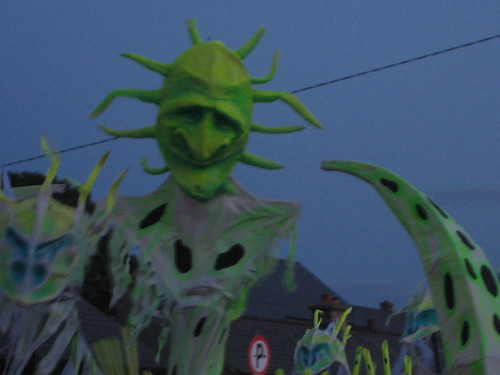In European History class in high school, we watched an '80s Australian
miniseries called
A Town Like Alice, based on the
novel by
Nevil Shute. It's the story of an English girl caught in Malaya during the Japanese invasion, and who is aided by a courageous Australian soldier during the ensuing death march. I loved the film so much I special-ordered the novel from Waldenbooks, though I never got around to reading it.
Ten years later I find myself reading WWII-era novels for secondary research—they're very useful for picking up lingo as well as historical tidbits I might not necessarily find in my nonfiction reading—and I've finally delved into the work of Nevil Shute. He was an aeronautical engineer during the war, and he had a highly successful writing career on the side. (For me that's fascinating enough in itself.) His novels are unsentimental yet very moving. His prose is transparent, and I mean that admiringly. The man knew how to tell a yarn. Reading his work makes me sad for two reasons: 1, that it's hard to find a bestseller these days that's anywhere near as well written; and 2, that Shute isn't more widely read today. It looks like all but his most popular novels are now out of print.
There's more than one English-Aussie romance in Shute's body of work—I just finished
Requiem for a Wren, and while you can tell what happens from the title it was still a page-turner. (By the way, "
wren" is a nickname for a member of the Women's Royal Naval Service.) It's the story of wren Janet, who falls in love with Bill, an Australian "
frogman," who's killed during a dangerous mission just before D-Day. After the war Bill's brother Alan (an accomplished RAF pilot who only meets her once) becomes increasingly obsessed with finding Janet again.
That day remained etched sharp in my memory; ten years later I still knew exactly how she moved and spoke and thought about things, so that it gave life to all the knowledge I had gleaned about her from these other people.
Janet pretty clearly suffers from post-traumatic stress disorder, and the novel deals with her inability to create a post-war life for herself. She wants very badly to return to naval service because the war had given her a sense of purpose she can't seem to find anywhere else. As Alan (who does the narrating) reflects, "A war can go on killing people for a long time after it's all over." We most often hear the stories of those men and women who survived and built new lives for themselves in the post-war period—because those people, our grandparents and their friends, are still around to tell them—so this novel felt like something of an eye-opener for me.
It's also a fascinating look at the life of a trio of service members in the run-up to D-Day. Everyone had their own part to play, but you couldn't talk much about the work you were doing. "Security was so good that neither he nor Bill appreciated the very great importance of the job they had been sent to do." The descriptions of all the tanks and ships amassing for battle is fascinating as well:
At sea, monstrosities of every sort floated in the Solent, long raft-like things proceeding very slowly under their own power, tall spiky things, things like a block of flats afloat upon the startled sea.
Another Shute novel I loved is 1942's
Pied Piper, about an elderly Englishman vacationing in the Jura mountains of France who agrees to accompany several small children back to England in the wake of the Nazi invasion. Like
Requiem for a Wren (which was published in 1955), the narrative framing device means you know from the get-go that things are going to turn out all right, so it's another testament to Shute's storytelling prowess that you still can't put it down. John Howard, the hero of
Pied Piper, is only 69, but Shute portrays him as far more frail than any 69-year-old I've known. He winds up fishing in a remote part of France, intentionally losing touch with the news, because he can't stand sitting around in England feeling impotent. He wants to serve his country in some way, but every application he makes is denied. In
Requiem, Janet's 64-year-old father successfully applies for a job as an aircraft identifier in the merchant navy. When Janet remarks on one comrade who looks particularly elderly, her father replies, "He says he's sixty-three. If you don't walk with a stick they don't ask too many questions."
And how do children cope with such hideous violence? This is another aspect of war that gets glossed over in the standard history textbooks. John Howard is a tender guardian, doing his best to distract his young charges from the horrors all around them. These kids are so young they don't understand the concept of death yet, so they're very curious. "You mustn't go and look at people when they're dead," he tells them. "They want to be left alone."
How did I find these wonderful books if they're out of print?
Charlie Byrne's, Galway's best bookshop, has a section of '60s dime-store novels: war, adventure, spies, tear-jerkers, you name it. It's easily overlooked—a narrow bookcase wedged between the Irish literature section and the doorway to the travel/music/film/history room. I've been going to Charlie's for years and I only noticed it a few months ago, on the day I found out we'd sold Petty Magic (so I arrived ready to treat myself). I bought nearly a dozen of these novels for €2-3 each and they've been both entertaining and useful. I love the smell of these old books too.
 I was stalking this swan and her cygnet along the canal for a week or two before I got the opportunity to take this shot, during which time the baby grew quite a bit.
I was stalking this swan and her cygnet along the canal for a week or two before I got the opportunity to take this shot, during which time the baby grew quite a bit. And here are some flowers for Snookie—hydrangeas are her favorites (sorry, I haven't spotted any blue/purple ones).
And here are some flowers for Snookie—hydrangeas are her favorites (sorry, I haven't spotted any blue/purple ones).









